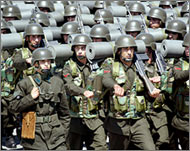Israel risks Turkish accord
When Turkey’s prime minister accused Israel of being a terrorist state last week, he was joining a growing chorus of anti-Israeli remarks from Turkish politicians.

Yet despite public outrage at the recent actions of Israeli forces, Turkey remains largely open for business with Israel, despite recent setbacks for Tel Aviv in its efforts to boost military ties with Ankara.
“Turkey’s mood has definitely been turning sour towards Sharon and his actions recently,” leading columnist and broadcaster Ali Birand told Aljazeera.net.
“For the first time, the government is showing very explicitly and strongly that they don’t approve of what he is doing.”
Prime Minister Recep Tayyip Erdogan reportedly made his remarks during a meeting in Ankara with Israeli Infrastructure Minister Joseph Paritzky, who told reporters afterwards that he had been “astonished” by the Turkish leader’s remarks.
Meanwhile, Turkish Foreign Minister Abd Allah Gul suggested that Turkey might recall its ambassador in Tel Aviv for consultations while boosting its representation with the Palestinian Authority via the appointment of a diplomat with ambassador status to its consulate in Jerusalem.
“At a time when all these actions are underway and because we are so closely interested in the peace process we are wondering what more we can do to revive the peace process. In order to evaluate all these, our ambassador may come back in the next few days,” Gul told journalists at the end of May.
Weapons trade
In another blow to relations, Turkey cancelled several major weapons contracts to re-equip its ageing tank and helicopter forces in mid-May. Israeli companies were hoping for a major role in this $11 billion procurement programme.
These developments have all come despite a long history of close ties between Muslim Turkey and Israel.
“There are several reasons why this is so,” says Ferhat Erkmen, a Middle Eastern analyst with the Ankara-based policy thinktank, AVSAM.
 |
|
Two Kurdish women demonstrate |
“Turkey has long had problems with some of its Arab neighbours – Syria, for example, long supported Kurdish terrorism in Turkey, as did Iraq and Iran.
“We have several border issues with Arab states too and also water disputes. All this helped make Israel a more attractive proposition.”
In 1999, joint Israeli-Turkish pressure on Damascus forced Syria to expel the leader of Turkey’s Kurdish insurrection, Abd Allah Ocalan, from the country. He was then captured by Turkish special forces.
“I think too, with the ‘war on terrorism’,” says Erkmen, “Israeli and Turkish intelligence services have most likely been helping each other track al-Qaida militants, such as those who bombed Istanbul last November.
“The principle reason for the Turkish-Israeli alignment,” Erkmen argues, “is the USA.”
Military dependence
Turkey’s military has long depended on the US for its equipment and technology. Due to various Congressional embargoes and restrictions on selling weapons to Turkey, Israel has acted in the past as a convenient go-between in circumventing these difficulties.
 |
|
Modernising the Turkish military |
“The modernisation of the Turkish military is a very important project for Turkey,” adds Erkmen, “and Israel had offered to do this.”
Thus the cancellation of Turkey’s $11 billion procurement project two weeks ago had a powerful effect on Turkish-Israeli relations. It also signalled a significant shift in other areas of thinking in Ankara.
“This represents a very important shift in mentality and philosophy,” says Birand. “The military has finally decided to face today’s realities. We don’t face any dangers in the Aegean any more, nor really over Cyprus. The Soviet Union is long gone, and so has Saddam. Because of all this, we don’t need vast numbers of tanks and attack helicopters.”
The dramatic slashing of Turkey’s military procurement budget reduced a planned purchase of 1000 main battle tanks to just 250, while an order for 145 attack helicopters was sliced down to just 50.
Plans for airborne surveillance aircraft and eight submarines are also reportedly being reassessed. The programme now has a budget of $5 billion.
No change
The cutbacks are also widely thought to be part of the continuing internal tension between Turkey’s staunchly secular military and its government, which has pro-Islamist roots.
“The military saw the reality here – that there wasn’t the money to pay for this – and because of the general malaise in relations between the generals and the government, they decided not to push it,” says Birand.
 |
|
Some say Sharon’s policies will |
“They knew the public would not support such a vast programme and would back the government if it opposed them, so the military saw the danger and backed off, accepting the cuts.”
But despite the recent setbacks in Turkish-Israeli relations, many are still sceptical as to whether anything has really changed.
“The fact that Israel was an interested party in the procurement plan, and that the plan was then cancelled, was largely coincidental,” Birand suggests, “though Turkey is trying to back away from Israel, none the less.
“If Sharon continues as he is going, then the military side of Turkey’s relationship with Israel is bound to be questioned and there may be a suspension of military agreements.”
Meanwhile, others point to the fact that despite Erdogan’s outburst, his meeting with the Israeli minister was very successful.
Big deals
Paritzky oversaw the signing of an $800 million deal for the construction of three natural gas power stations in Israel between Israel’s Dorad Energies and Turkey’s Zorlu Holding.
“I asked sarcastically, ‘Are you making deals with a terrorist nation?'” Paritzky quipped after the meeting. “He (Erdogan) smiled and didn’t answer.”
“Traditionally, every Turkish government has a problem with what Israel does,” says Erkmen, “but goes on to sign all sorts of important agreements with them. Now we’re seeing the same movie all over again.”
While anti-Israeli rhetoric may win support from most Turks, it seems the government has an eye on continuing to please the country’s business and military leaders.